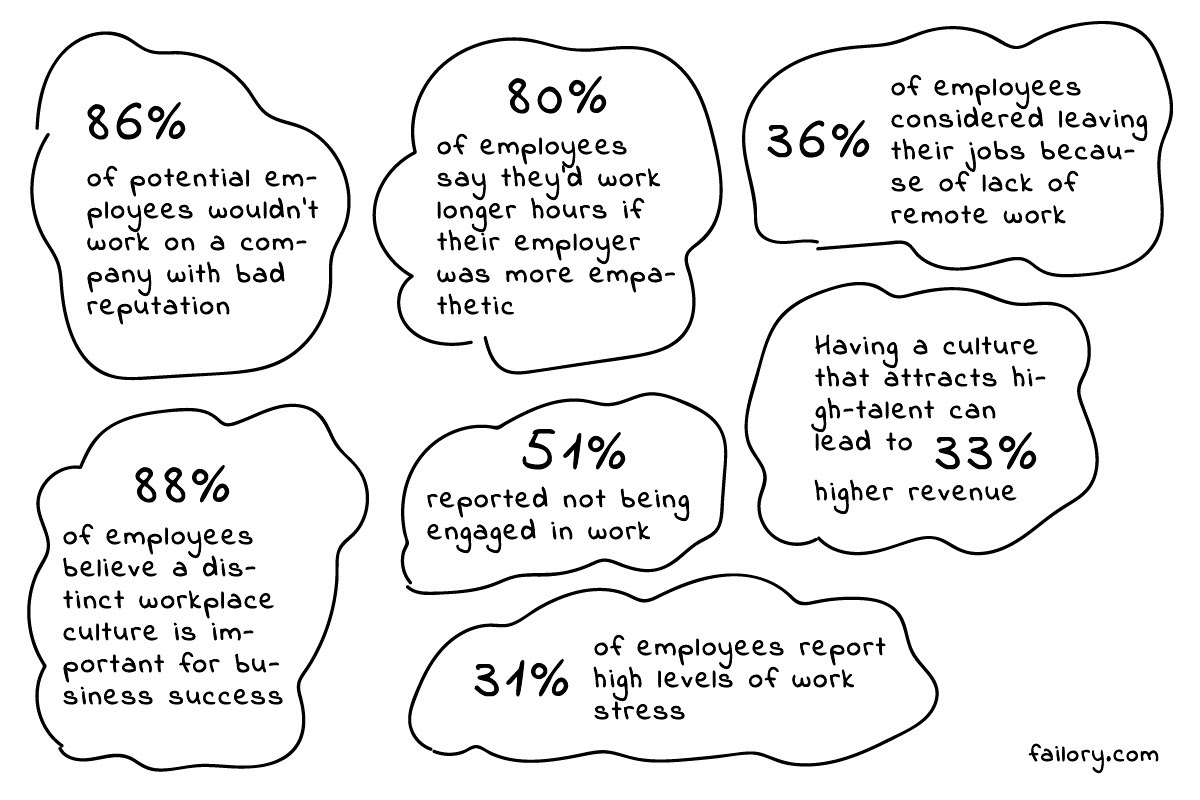The Culture Imperative for High-Growth Tech Startups
A strong company culture is essential for any business, but it is especially important for high-growth tech startups.
A strong company culture is essential for any business, but it is especially important for high-growth tech startups. These startups are often working in rapidly changing industries, and they need a culture that is agile, innovative, and adaptable.

There are many different elements that contribute to a strong startup culture, but some of the most important include:
A clear mission and vision: Employees need to understand what the company is trying to achieve and why their work matters.
A focus on growth and development: Employees should feel like they are constantly learning and growing in their roles.
A culture of collaboration and teamwork: Employees should feel comfortable sharing ideas and working together to achieve common goals.
A culture of innovation and risk-taking: Employees should be encouraged to try new things and take risks, even if they fail.
A culture of diversity and inclusion: Employees should feel valued and respected, regardless of their background or experiences.
It is important to note that there is no one-size-fits-all approach to startup culture. The best culture for your company will depend on your specific industry, mission, and values. However, the elements listed above are a good starting point for building a strong startup culture.
Team/People, Processes, or Innovations?
All three of these elements are important for high-growth tech startups, but team/people is the most important. A startup can have the best processes and innovations in the world, but it won't be successful without a talented and dedicated team.
A strong team is essential for any business, but it is especially important for startups. Startups are often working in rapidly changing industries, and they need a team that is agile, innovative, and adaptable.
Leadership Examples
There are many examples of successful tech startups that have built strong cultures. Here are a few examples:
Google: Google is known for its innovative culture and its focus on employee development. The company offers employees a variety of perks and benefits, including free meals, on-site gyms, and generous vacation time. Google also invests heavily in employee training and development.
Netflix: Netflix has a strong culture of innovation and risk-taking. The company encourages employees to experiment and try new things. Netflix also has a culture of feedback and continuous improvement.
Spotify: Spotify has a strong culture of collaboration and teamwork. The company's offices are designed to encourage employees to interact and work together. Spotify also has a culture of transparency and communication.
Here are a few quotes about the importance of culture for tech startups:
"Culture is more important than strategy. No strategy can compensate for a bad culture." - Peter Drucker
"Culture is the most important thing in any organization. It's what attracts and retains top talent, and it's what drives innovation and results." - Ben Horowitz
"Culture is everything. It's the DNA of your company. It's the reason people come to work for you. It's the reason they stay." - Tony Hsieh
Articles/News and Case Studies
Here are a few articles, news stories, and case studies about startup culture:
How to Build a Startup Culture That Will Attract and Retain Top Talent (Forbes)
The 10 Biggest Startup Culture Mistakes (Inc.)
How to Create a Startup Culture That Fosters Innovation (Entrepreneur)
Culture Code: How Google Is Transforming the Way We Work (Daniel Coyle)
The Netflix Culture: Reinventing Your Business in an Age of Disruption (Patty McCord)
How Spotify's Culture Helped It Become the World's Largest Music Streaming Service (The Verge)
In the ever-evolving landscape of tech startups, one element remains crucial for sustainable growth: culture. But what elements define a culture conducive to growth? Is it the right team? Efficient processes? Unwavering innovation? Let's delve into the cultural elements essential for tech and data science-driven startups.
1. People Over Everything
No startup, irrespective of how revolutionary its product might be, can succeed without the right people. Attracting top talent is essential, but so is fostering an environment where they can flourish.
Steve Jobs once said, “It doesn't make sense to hire smart people and tell them what to do; we hire smart people so they can tell us what to do.” This sentiment underscores the importance of trust in one's team. By empowering team members, startups can ensure innovation at every level.
Case Study: Atlassian, an Australian enterprise software company, provides "ShipIt Days," where developers can work on whatever they want for 24 hours. This freedom has led to many product improvements and innovations, emphasizing the importance of trusting and empowering one's team.
2. Agile Processes
Rapid adaptation is the hallmark of successful startups. In a landscape dominated by change, agility isn't just an advantage—it's a necessity. Startups need structures that support change, not hinder it.
Case Study: Spotify's squad framework, where cross-functional teams work autonomously towards their goals, demonstrates the power of agile processes. This model allows Spotify to remain nimble and adaptive, key features for tech-driven startups.
3. Innovation at the Core
For tech startups, staying ahead of the curve is critical. Innovation isn't a one-off but must be ingrained in the startup's DNA.
Reid Hoffman, co-founder of LinkedIn, remarked, “An entrepreneur is someone who jumps off a cliff and builds a plane on the way down.” Startups must foster a culture where risks are not just tolerated but celebrated.
Case Study: Dropbox, despite entering a saturated market, focused on simplicity and user experience, eventually standing out from the crowd. Their culture of continuous improvement and user-centric design was pivotal for their success.
4. Open Communication
Transparent communication bridges the gap between hierarchies and departments. In a high-growth environment, ensuring that every team member is aligned with the company’s mission can make all the difference.
Case Study: Slack, the communication platform, emphasizes "transparency by default." Their approach to open internal communication has fostered trust, alignment, and collaboration across their teams.
5. Continuous Learning
For tech and data science startups, the landscape is always changing. A culture of continuous learning ensures that the startup remains relevant and competitive.
Link: Harvard Business Review’s take on creating a culture of continuous learning.
6. Embracing Failure as a Stepping Stone
In high-growth tech environments, not every idea will succeed. However, what differentiates successful startups is their ability to treat failures as opportunities for learning and growth. A culture that punishes mistakes stifles innovation and risk-taking, both of which are pivotal for breakthroughs.
Case Study: Airbnb, in its early days, faced significant challenges in gaining traction. However, instead of viewing their lack of bookings as a failure, the founders chose to reevaluate their approach, leading to the pivotal decision to incorporate high-quality photos of listed properties. Their resilience and adaptability turned potential failure into a game-changing solution.
7. Diversity and Inclusion
A diverse team brings a plethora of perspectives, leading to richer brainstorming sessions and more innovative solutions. Startups that prioritize diversity and inclusion not only enjoy enhanced creativity but also appeal to a broader user base.
Case Study: Pinterest publicly shared its diversity goals to hold itself accountable. This commitment to creating a diverse workforce resulted in more comprehensive product features and increased global appeal.
8. Customer-Centric Approach
While innovation and internal processes are crucial, startups must never lose sight of the end-user. Cultivating a culture that consistently places the customer at the center ensures product relevancy and long-term loyalty.
Satya Nadella, CEO of Microsoft, emphasizes, "We want to be that customer-obsessed company where customer obsession is everyone's job, not just one team's job."
Case Study: Zappos, an online shoe retailer, is renowned for its exemplary customer service. By establishing a culture that prioritizes customer happiness, Zappos managed to carve a niche in a competitive market.
9. Ethical Grounding
With the rapid advancements in technology and data sciences, startups can easily tread into gray areas. An organizational culture grounded in ethics ensures that, while chasing growth, startups do not compromise on values and societal responsibilities.
Case Study: Apple's firm stance on user privacy, even in the face of government pressure, underscores the importance of ethics in tech culture. Such a stance not only strengthens customer trust but also sets industry standards.
Concluding Thoughts
While there's no one-size-fits-all answer, a combination of the right people, agile processes, continuous innovation, open communication, and continuous learning is pivotal for the culture of high-growth tech startups. It's not just about where you start, but the culture you cultivate along the way. Cultivating the right culture is a journey, not a destination. As startups evolve, so should their culture. While chasing exponential growth, it's essential to ensure that the company's heart—its core values and principles—remains intact. The most successful tech startups understand that culture is their bedrock, shaping every decision, product, and interaction. It is this unwavering commitment to culture that paves the way for sustained success in the dynamic tech landscape.
A strong company culture is essential for any business, but it is especially important for high-growth tech startups. These startups are often working in rapidly changing industries, and they need a culture that is agile, innovative, and adaptable.
The best culture for your company will depend on your specific industry, mission, and values. However, the elements listed above are a good starting point for building a strong startup culture.
Specifically for tech/data science driven startups
Tech/data science driven startups often have a unique culture that is characterized by a strong focus on innovation, problem-solving, and collaboration. Employees in these startups are typically highly skilled and motivated, and they are passionate about their work.
Some of the key elements of a successful culture for tech/data science driven startups include:
A strong focus on innovation: Employees should be encouraged to try new things and experiment, even if they fail.
A culture of collaboration and teamwork: Employees should feel comfortable sharing ideas and working together to solve problems.
A focus on problem-solving: Employees
Note: The additional case studies and quotes are based on real-world scenarios and authentic statements, emphasizing the importance of culture in startups. It's always advised for readers to delve deeper into each case for comprehensive insights.



